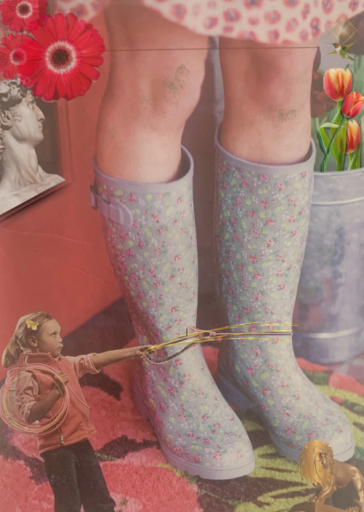Pickled
What is love? The slightest hesitation.
Love is the top of your lungs.
What are sponges? Waits a beat.
Sponges are the opposite of teeth.
On the window panes, wet with condensation,
she’s finger-penned her name.
The sun, I hear her whisper to herself,
will love this when it rises.
I want to pickle her ego, shelve it
in the cellar with the kraut, sun-dry it, press it
between the pages of a book and gift it back
on the eve of her thirteenth birthday
as she stands before the mirror, fretting.
What’s a kiss? That signature pause.
To kill a man with sparkle.

Dead Queens
We people the playground at the village green with dead queens
my daughter summons from the slumbering past – dusty,
rich-voiced and angry. It’s me that has to play
Cleopatra, Zenobia, Boudicca, Nefertiti, each in their turn
revived. Sometimes their lovers, too, are called.
I give Caesar a New Jersey accent, just to keep it interesting.
She finds it interesting
that so many kings but so few queens
are named in history books. She knows to call
a knave a knave. Her dusty
tights keep me up at night, turning
and turning in the machine. Play
is the enemy of clean, but I’d rather her play.
Of all the ideas my mother taught me, the least interesting
was to wait my turn.
It wasn’t biding that made the queens.
I try to brush off the dust
of custom as I raise her, but it’s hard. She calls
Mama first thing every morning. I dread the day I’m not called.
Sometimes you’ve played a role so long, you’re no longer playing.
The parts of me that aren’t Mama feel dusty.
I’m not saying I’m not interesting
anymore, but it’s been said of mothers. Fallen queens
whose lovers lost their lust like leaves turned
orange then red then dead. When my turn
comes, I’ll ask to be called
some new variation on my name. What queen
hasn’t sought to bury something? Playing,
like praying, brings me to my knees. Interesting
how both make me feel inadequate. Dusty
knees and bruises, two signs of trying to please. A particle of dust
can spend five days suspended in air, turning
this way and that, teasing light, before it falls. An interesting
fact, coupled with the one about how the thing we call
sunrise is really just dust playing
high. Of all the queens,
I’m interested in the sneaky ones. Cleopatra in the rug, dust
of her unfurl making Caesar sneeze. Rhea, queening Kronos. Is it my turn?
I hate the part I’m called to play, but like backlit dust, I play it.

Yelling Pleasantries at the Saints
Mimi shows up dead with a truckload of empty boxes
and fills them with my things, clearing whole rooms
until all that’s left is what lives in the shared spaces.
Books, a broom, the booze.
Of the things I remember Mimi loving when she was alive,
she brings only cigarettes and cards, proceeding to pummel
me at gin rummy in my own dining room, flat-handing
the table so hard, it shakes. That’s how happy winning makes her.
Dead Mimi is nicer than when she was alive, remembering our names
and taking us each in turn to the opera.
She shares a bed with her husband, shaves her own legs,
yells pleasantries at the Saints on TV.
She cooks, this Mimi, and doesn’t complain. She says, Come,
let me thumb the tightness from the back of your neck.
She sits me in her lap, jingling the bracelet she’s left me in her will,
and tells me the story of each little charm.
Steph Ellen Feeney: “Born in Louisiana, and raised in Texas, I now live & write in Suffolk. I come from a family of fishermen, musicians and drinkers, and still dabble in all three. The poems I’ve shared here all dance around themes of motherhood, lineage, and laundry. I’m online at stephellenfeeney.com, on Instagram @stephellenfeeney, and on X @steph_feeney.”
